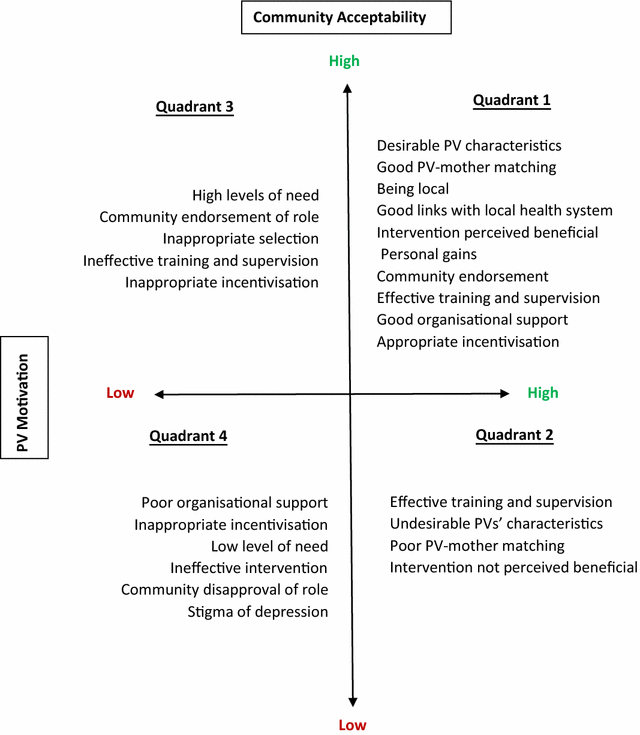Barefoot therapists: barriers and facilitators to delivering maternal mental health care through peer volunteers in Pakistan: a qualitative study
- PMID: 26985235
- PMCID: PMC4793537
- DOI: 10.1186/s13033-016-0055-9
Barefoot therapists: barriers and facilitators to delivering maternal mental health care through peer volunteers in Pakistan: a qualitative study
Abstract
Background: Perinatal depression is a public health problem in low and middle income countries. Although effective psychosocial interventions exist, a major limitation to their scale up is the scarcity of mental health professionals. The aim of this study was to explore the facilitators and barriers to the acceptability of peer volunteers (PVs)-volunteer lay women from the community with shared socio-demographic and life experiences with the target population-as delivery agents of a psychosocial intervention for perinatal depression in a rural area of Pakistan.
Methods: This qualitative study was embedded in the pilot phase of a larger peer-delivered mental health programme. Forty nine participants were included: depressed mothers (n = 21), PVs (n = 8), primary health care staff (n = 5), husbands (n = 5) and mothers-in-law (n = 10). Data were collected through in-depth interviews and focus groups and analysed using the Framework Analysis approach.
Results: The PVs were accepted as delivery agents by all key stakeholders. Facilitators included the PVs' personal attributes such as being local, trustworthy, empathetic, and having similar experiences of motherhood. The perceived usefulness and cultural appropriateness of the intervention and linkages with the primary health care (PHC) system was vital to their legitimacy and credibility. The PVs' motivation was important, and factors influencing this were: appropriate selection; effective training and supervision; community endorsement of their role, and appropriate incentivisation. Barriers included women's lack of autonomy, certain cultural beliefs, stigma associated with depression, lack of some mothers' engagement and resistance from some families.
Conclusion: PVs are a potential human resource for the delivery of a psychosocial intervention for perinatal depression in this rural area of Pakistan. The use of such delivery agents could be considered for other under-resourced settings globally.
Keywords: Low and middle income countries; Peer volunteers; Perinatal depression; Psychosocial intervention; Task shifting; Thinking Healthy Programme.
Figures
References
-
- Wachs TD, Black MM, Engle PL. Maternal depression: a global threat to children’s health, development, and behavior and to human rights. Child Dev Perspect. 2009;3:51–59. doi: 10.1111/j.1750-8606.2008.00077.x. - DOI
Grants and funding
LinkOut - more resources
Full Text Sources
Other Literature Sources
Research Materials


